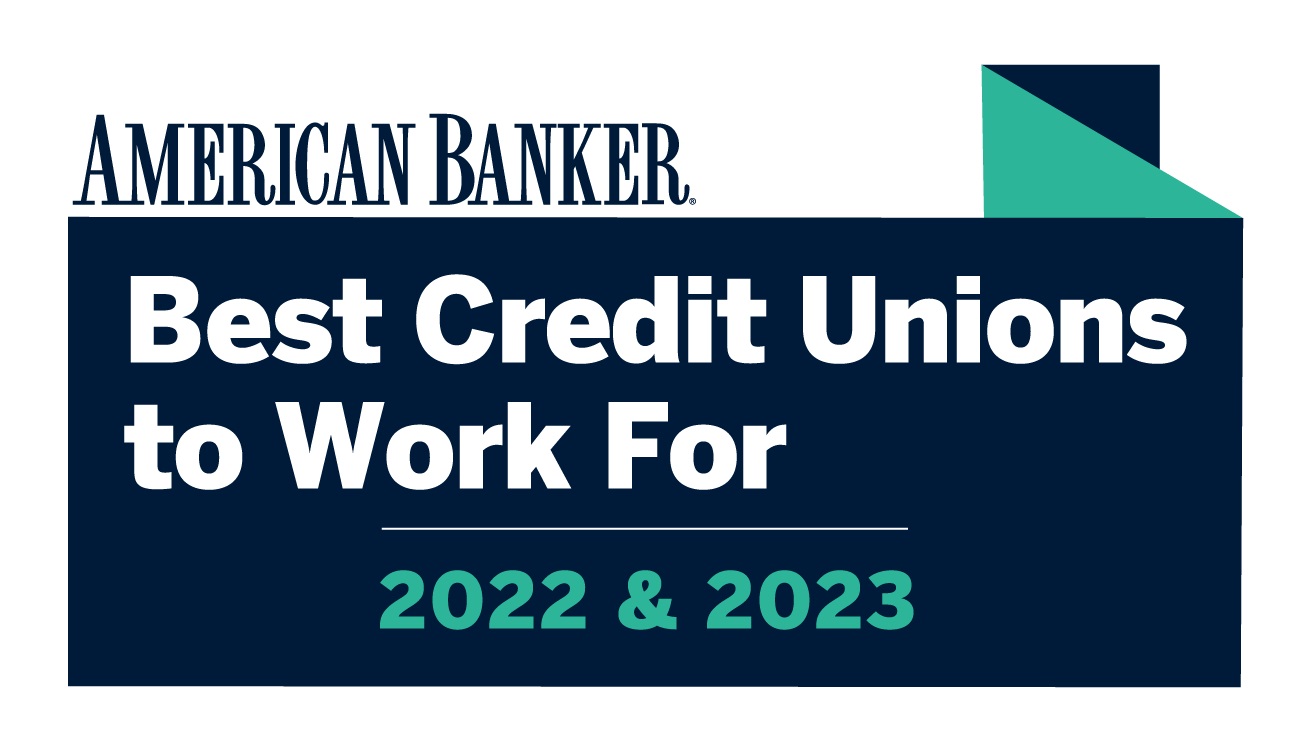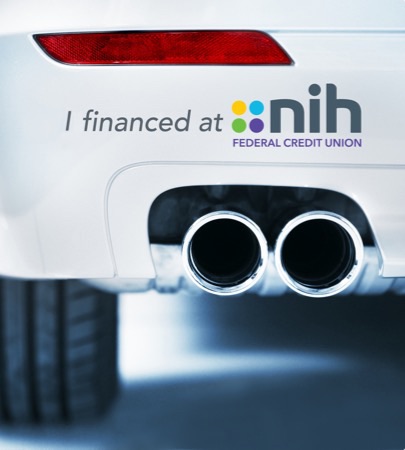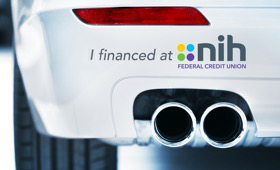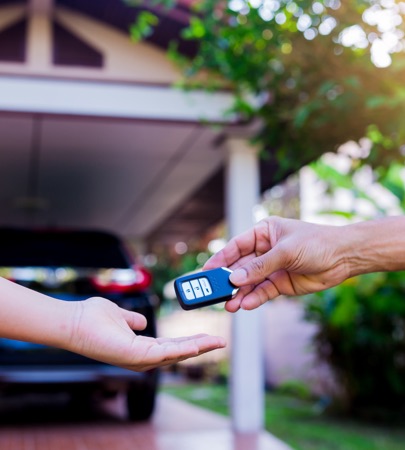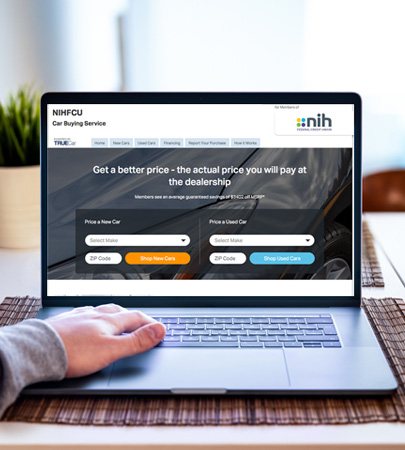|
Avoiding the anxiety of buying a car starts with preparation. It starts with knowing what vehicle you want, right down to the trim level, options, and color. Below are some steps to help you negotiate successfully.
Knowledge Is Power
Today’s consumers have more information about the car-buying process than ever before. You can learn about every phase, from trade-ins to car deals, financing, and auto insurance on your computer, tablet, or mobile device.
Never go to the dealer without knowing your credit score and pre-approved financing in hand (With an NIHFCU pre-approval in hand, you’re off to a great start).
Used car shoppers can also go online to separate the cars they should consider and ones they should not. Websites provide vehicle history reports that can show problems with a pre-owned car before you waste time looking at lemons.
Not every car costs the same to insure. Getting insurance quotes when you’re car shopping can save you from sticker shock after you’ve already committed to an expensive-to-insure new or used car.
Remember It Is a Business Transaction
Buying a car is a business transaction — nothing more, nothing less. Unchecked emotions can get in the way of you getting a good deal. As pleasant as the dealership staff may be, they are not your new best friends.
Some buyers think they can bully their way to a great deal. However, what will usually happen is the dealership will find a way to stick it to the rude customer. On the flip side, some salespeople will attempt to confuse, persuade, and perhaps even intimidate you into taking a deal that’s not good for your wallet. That’s why it’s essential to have a friend along who can see that happening, even if you don’t.
Car salespeople are trained in negotiating and excel at moving you incrementally to the deal they want you to take. You, however, have the strongest position – you can always walk away. Being polite and level-headed is the name of the game wherever you are in the car buying process.
Don’t Focus on the Payment
This is one of the most critical pieces of car-buying process, but it’s also the one that buyers most frequently ignore. While you need a car payment that fits into your monthly budget, focusing on the monthly payment alone is the fastest way to getting a horrible deal.
A big secret of the car business is that if you can keep customers focused on the monthly payment, you can play with the other numbers in the transaction to get the profit you want. The customer will end up paying far more in the long run, and they’ll never realize they got a lousy deal. Instead, you want to look at the car’s total cost, including financing, fees, and add-ons.
A common method is to extend your loan out to six, seven, or even eight years, which lowers the monthly payment, but greatly inflates the total amount of interest you’ll pay. In addition to the extra interest, you’ll also face the possibility of needing costly repairs on your aging car while you still have car payments to make. The longer the loan, there’s more chance of having an underwater car loan, which means you owe more on the car than it is worth.
Know the Deals
When there’s a new car on the way, or a vehicle is just not selling as fast as automakers desire, they’ll offer money-saving discounts. For buyers, that means financing deals that reduce or eliminate the cost of interest and cash back offers that reduce the vehicle’s price. Both purchase and lease deals are no-haggle ways of dramatically paying less for a new car.
While you don’t have to haggle to get a deal, a salesperson may not volunteer that there’s an offer available. Unless you have done your research and know about the offers, you can’t be assured of getting the good deal you deserve.
Think About Financing Early
An easy way to give the dealership the upper hand is to have them arrange your financing – committing you to one of the most profitable products a car dealership sells.
Adding financing into the negotiation process also gives them another, often confusing, lever they can adjust. In some cases, a dealership will suggest a financing deal that makes them the most money, rather than giving you the best deal. Instead, smart buyers know to never get within a mile of a car dealership without having a pre-approved financing offer in hand. So, great job in securing your financing from the NIHFCU before you go to the dealer!
Separate the Trade-In
Another item the salesperson will want to mix into your car deal is the value of your trade-in. You don’t want that to happen, as it adds another ingredient of confusion. If you do, you need to watch the transaction closely to ensure that they’re not using the trade-in’s value to push other numbers around.
An experienced salesperson can show you a great price on your new car by lowballing your trade value. They can show you a fantastic trade-in value by jacking up your car’s price or adding another year onto your financing.
How do you avoid this? First, be undecided about whether you’re going to trade-in your car or not, and force them to structure the deal as though you are not. Then you can bring the trade-in up at the end. Along the way, you’ll want to have checked the current value of your car to ensure you’re getting a reasonable price.
Another way is to sell the car yourself, either to another dealership or a private party. Some used car superstores have streamlined processes that make selling your car easy and quick. You can also seek an instant cash offer, which gives you a price you can expect from any dealer who participates in the program. It’s a relatively new and easy way to unload your old ride. Last, you can sell your car to another private party. Private sellers will likely get the most money, but it doesn’t come without some hassles, including its own negotiation process.
Negotiate the Price First
Your main goal as a buyer is to get the lowest possible price on the vehicle while the salesperson wants to get the most money for their dealership. Dealerships will usually want to include your trade-in and financing when putting together a deal because it can create complexity and confusion. You want to keep the components separate, focusing on the price of the car.
There’s a saying about negotiation: The first person to speak loses. While that’s an oversimplification, it is true that once the dealer suggests a price, they can’t go any higher. One you say how much you’re willing to pay, you can’t get any lower. You should always have a fact-based reason why you can’t go any higher, and force the salesperson to have a provable reason to justify their counter-offer.
It’s natural to want to fill in any gaps in the conversation by talking. That’s a strategy that a trained salesperson will use to try to get you to take their deal. Please don’t fall for it. Say what you want to say, then be quiet, no matter how deafening the silence is. When the salesperson finishes, don’t say anything until there’s a question.
A car dealer is entitled to a certain amount of profit – that’s how they stay in business. So don’t make your initial offer insultingly low. The final price will likely fall somewhere between the dealer invoice cost and the window sticker’s price, less any available rebates.
It is essential to know what you can negotiate and what is non-negotiable. Don’t waste your time trying to negotiate the destination charge on the window sticker, but do question any additional freight charges a dealer might try to sneak in. You won’t be able to negotiate taxes or registration costs. Still, junk fees such as advertising fees, documentation fees, and other miscellaneous costs should be discussed. If the dealer has added something to the car that you don’t want, you should request it be removed and note that you won’t pay for it. That includes things like window etching and nitrogen in the tires.
Timing Is Your Key to Savings
Showing up at the dealership right before closing time won’t get you a great deal on a car. A better way to time your purchase or lease is to look at the calendar. Like many businesses, car salespeople have commissions and bonuses based on the ends of months, quarters, and years. Buying a car toward the end of those periods gets you much better odds of negotiating a great deal. Of course, that’s only true if the salespeople and their dealership haven’t already hit their goals.
It helps if you are ready to go, with financing in place, to make the most of the timing. Miss the end of their bonus period by even one day, and any incentive they have to make you a good deal will be gone.
There’s More Than One Dealer
Getting prices from multiple dealerships used to be a huge hassle. Now it’s easy, and it helps you avoid one of the most common mistakes of car shopping: Getting prices from only one dealership. By getting prices on a car from more than one dealership, you can compare them against one another. It doesn’t hurt if salespeople know they’re competing against each other for your business.
It’s easier today, because you don’t even have to leave your house. By visiting multiple dealers’ websites and opening up discussions with their internet sales managers, you can request offers and barter back and forth.
Even if you have found the perfect model, trim, and color at one dealer, be sure to ask other dealers to price that precise configuration. Dealerships often trade vehicles, and you may have multiple outlets vying to sell you the same exact car.
Avoid Costly Extras
Just when you’ve come to an agreement on price, you’ll be ushered to the dealership’s financing office. If you’re not careful, this can be a perilous place for your wallet.
It’s where you’ll be pressured to buy add-ons. Some may be cheap, while others cost thousands of dollars. There is time pressure involved because the dealer wants to include the add-ons in the deal and possibly include them in your financing. They’re very good at selling the products and can make it sound like you need things before you can leave the dealership.
Here’s the truth. Most of the things you are offered are available outside of the dealership from third-party companies. They can be purchased at lower prices elsewhere. Even if it must be purchased at the dealership, they’ll be more than happy to sell it to you even months or years down the road.
See NIHFCU protection programs at prices commonly much lower than the dealer
Read the Paperwork
Before you leave the dealership and no matter how anxious you are to get on the road, it’s critical that you read and understand every document that’s put in front of you. Check all of the numbers, making sure the car price is correct, as are any loan terms and trade-in values.
Watch out for any add-on or unexplained fees that have appeared at the last minute. It’s a good idea to have a sharp-eyed friend or family member along to double-check the documents. Never sign a form that is incomplete or incorrect. It’s much harder to correct errors once a document has your signature on the bottom line.
Never leave a dealership with a new or used car unless you are certain that the lender approved your financing and all of the loan paperwork is complete. Without those safeguards, you can fall prey to an old-timey scam known as yo-yo financing.
Yo-yo financing starts off with a dealership assuring you that you’re free to drive away in your new ride. They might not tell you that your purchase is still contingent on the lender approving the financing. Sometimes they’ll genuinely believe that you’ll qualify. Other times the financing officer will know that you don’t have a chance of getting the loan deal they offered, and you agreed to.
About a week or so after you’ve left, you’ll get a call saying that there was something wrong with your financing, and you need to come back and work things out. When you return, you’ll be faced with a much more expensive financing package. At this point, many buyers see no other way than to sign the new documents and pay the outrageous price. There will be a high-pressure push to get you to sign, and after a week, you may have developed an attachment to the car.
What you should do if this happens to you is immediately start looking for financing from local credit unions, online lenders, and banks. Get pre-approved for the best deal you can get, and have it in hand when you go back to the dealership. If you can’t get a good enough deal that the vehicle’s affordable, you need to be prepared to drop it back off at the dealership and walk away.
With NIHFCU approved financing, you’ve done a great job in avoid this scam!
Be Prepared to Walk Away
While it might seem that the dealership has all of the power in the negotiation, it’s really all in your hands. You have the greatest strength, and it is to walk away from a deal that you don’t like. It’s a power that far too few shoppers take advantage of.
Many people won’t walk away because they’re embarrassed, or they like the salesperson. Others are reluctant to walk away from the time they’ve invested in the process. The truth is, if you’ve invested your time in a bad deal, not walking away will see you spending your money on that lousy deal for the length of your loan. It’s a poor decision that can haunt your pocketbook for years.
One way salespeople try to prevent you from walking away is by having you sign the offer sheets during the negotiation process, as if your signature locks you into the deal. It doesn’t. The agreement is not final until you sign the last documents in the financing office.
It is important to walk away the right way. Don’t leave fuming angrily, leaving skid marks in your wake. Instead, say something like, “it looks like we’re still a ways apart, but please call me if you can find a way to make this deal work.” If they’re close to goal at the end of the month, you’ll get a phone call. Sometimes they’ll even chase you across the parking lot.
source: cars.usnews.com/cars-trucks/tips-for-negotiating-at-a-car-dealership
|

